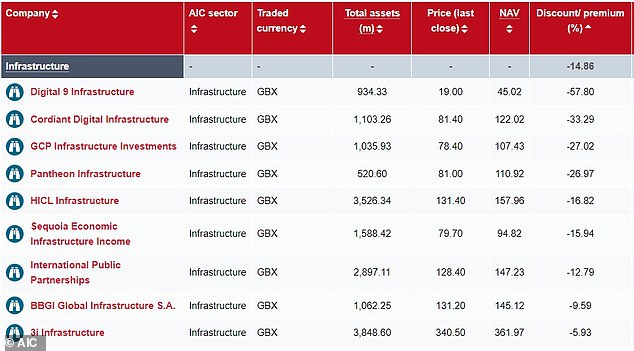Table of Contents
Investment trusts are hoping to secure waves of fresh capital inflows after the government temporarily suspended enforcement of onerous cost disclosure rules.
This comes ahead of a post-Brexit regulatory shake-up, part of a government growth strategy that includes efforts to boost investment in UK capital markets, which have lagged behind peers in recent years.
Much of Britain’s investment trust sector has suffered from steep discounts to net asset values for some time, meaning that share values and total valuations are lower than the sum of their underlying assets.
A great time for mutual funds? London-listed funds see end to persistent discounts
Efforts to eliminate discounts, for example through share buybacks, have largely been unsuccessful, which the industry has blamed in part on consumer disclosure requirements inherited after Britain left the European Union.
Trusts must disclose their costs and charges in detail, but rules require institutional investors such as pension funds or banks to also disclose the costs of their investment to their underlying investors.
Industry lobbyists say that institutional investor inflows into investment trusts have effectively been halted as they are put off by the relatively high level of time and resources required.
The government says EU rules governing UK investment trusts and other financial sectors will be reviewed by 2025, with a “Consumer Composite Investments” regime more tailored to UK requirements set up.
‘Big Bang’ moment?
Her Majesty’s Treasury, the Financial Conduct Authority and City Minister Tulip Siddiq said in a joint statement: ‘Investment trusts are a well-established type of investment vehicle in the UK, accounting for over 30 per cent of the FTSE 250 and investing in over £260bn of assets in total.

City Minister Tulip Siddiq
‘They can be a valuable source of investment funding for both conventional and emerging asset classes.’
However, the statement noted that investment trust valuations and discounts “may be influenced by many factors, independent of regulation,” such as investment performance, general market sentiment and the interest rate environment.
William MacLeod, managing director of Gravis Advisory, which is behind the VT Gravis UK Infrastructure Income Fund and the VT Gravis Clean Energy Income Fund, said: “What has happened today is far less dramatic than the big bang of the 1980s, but for those of us in the sector and all investors in investment companies, it is no less seismic.
‘This is a momentous development that has been long overdue. The campaign group, with the immense help and dedication of Baroness Bowles and Baroness Altmann, has worked tirelessly for these changes for several years and today is a day of relief and celebration.
“Correcting this mistake is critically important for the UK market, the industry and investors of all sizes.”
Ryan Hughes, interim managing director of AJ Bell Investments, added: ‘The unintended consequences of current legislation created an uneven playing field that put investment trusts at a disadvantage and threatened, in some cases, their very existence.
‘Removing this unnecessary barrier will help the investment trust sector regain its footing and allow them to compete on a level playing field against other investment structures, putting them back on the radar of investors who have been reluctant to use them given the cost disclosure requirements.
“At a time when the Government is seeking to encourage investment in the UK and encourage private capital to drive economic growth, removing any barriers that could hold it back should be seen as a positive.”
‘Lost years of investment’ in infrastructure
Companies investing in illiquid assets such as infrastructure have been hit even harder by the deep discounts.
High interest rates have made investors wary of higher debt costs, long-duration portfolios and the possibility of a sharp downgrade in asset valuations.
Abrdn research shows infrastructure trusts are on track for their first three-year gap with no primary capital raised, which the asset manager says “reflects the dual impact of a higher interest rate environment and cost disclosure rules.”

AIC data shows infrastructure trusts have been hit by persistent discounting
Data from the Association of Investment Companies shows that London-listed infrastructure trusts currently trade at an average discount to net asset value of 14.9 per cent, ranging from 5.9 per cent for 3i Infrastructure to 57.8 per cent for Digital 9 Infrastructure.
Christian Pittard, head of closed-end funds at Abrdn, said: ‘The new government has made driving economic growth – channelling capital into areas such as renewable energy and infrastructure – its raison d’être.
‘These funds already invest billions in these areas and implement crucial economic growth projects.
‘However, cost disclosure rules, which have led to distorting ‘double counting’ of costs, have negatively affected investor sentiment, thereby obstructing flows into investment trusts.’
DIY INVESTMENT PLATFORMS

AJ Bell

AJ Bell
Easy investment and ready-to-use portfolios

Hargreaves Lansdown

Hargreaves Lansdown
Free investment ideas and fund trading

interactive investor

interactive investor
Flat rate investing from £4.99 per month

Saxo

Saxo
Get £200 back in trading commissions

Trade 212

Trade 212
Free treatment and no commissions per account
Affiliate links: If you purchase a product This is Money may earn a commission. These offers are chosen by our editorial team as we believe they are worth highlighting. This does not affect our editorial independence.
Some links in this article may be affiliate links. If you click on them we may earn a small commission. This helps us fund This Is Money and keep it free to use. We do not write articles to promote products. We do not allow any commercial relationships to affect our editorial independence.

